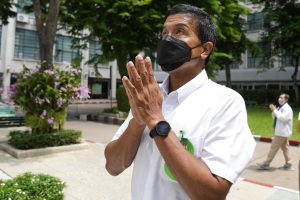A reformist former transport minister will be the next leader of Thailand’s capital after a resounding victory in this weekend’s Bangkok gubernatorial election, in a worrying sign for the current military-backed national government.
Chadchart Sittipunt, 55, a transport minister in the Pheu Thai Party (PTP) government that was overthrown in a military coup in 2014, won the election by a landslide, with more than half of the popular vote. Unofficial results announced by the Election Commission of Thailand show him winning 1.37 million votes to just over 250,000 for his two closest rivals. Elections to city councils saw a similarly decisive victory for opposition parties, including PTP, which picked up 19 seats and the Move Forward Party (14 seats) of the 50 on offer.
Chadchart described his victory in the May 22 election as a demonstration of the power of the democratic process and vowed to “overcome all past conflicts in order to move forward together.”
“I am ready to be the governor for everyone … we have to get beyond divisions and be united to take Bangkok forward,” he said, according to Reuters.
Bangkok is the only province in Thailand where the governor is elected rather than appointed by the Ministry of Interior. This arrangement has been in place since 1975, when the Bangkok Metropolitan Administration was formed and the rapidly expanding city became a special administrative entity run by an elected governor with a four-year term. But elections were suspended when Gen. Prayut Chan-o-cha, the current prime minister, launched a coup in 2014 – eight years to the day before Sunday’s election.
A record 31 candidates were gunning for the post, but by election day things had effectively narrowed down to a race of two, with Chadchart contending with Asawin Kwanmuang, who served as the military-appointed governor since 2016 and stepped down in March to contest the election. In the end, Asawin finished in fifth place with just 213,315 votes.
Chadchart’s victory can be put down to the long time he spent preparing for the election, following his resignation from the PTP in late 2019. His social media-driven campaign, which succeeded in turning the former minister into a deeply meme-able pop culture figure, succeeded in turning out the large segment of millennial voters in Bangkok, who were also overrepresented at the anti-government protests that roiled the capital in the second half of 2020 and early 2021. By quitting PTP and running as an independent, he managed to distance himself from a party that has historically had low levels of popularity in the capital.
While the victory was widely predicted and pre-election polls placed him well ahead over his rivals, the Bangkok gubernatorial elections have a long history of producing unexpected outcomes. Chamlong Srimuang (1985-92) and Bhichit Rattakul (1996-2000) were both dark horse candidates who pulled off shock wins. Meanwhile Sukhumbhand Paribatra (2009-16) won a second term in 2013, despite his general unpopularity, simply because he ran with the then-popular Democrat Party.
The election was also notable for sealing the electoral decline of the Democrat Party, which once counted Bangkok as something of a stronghold. Suchatvee Suwansawat of the Democrats came in a distant second place, with just 252,694 votes, three years after the party failed to win a single parliamentary seat at the 2019 election.
Most significant, perhaps, is what Chadchart’s election portends for the state of politics at the national level. As Diplomat columnist Tita Sanglee wrote in her preview of the election earlier this month, the polls shaped as “a barometer of where things stand and how Thais will vote in the next national election expected to take place before May 2023.”
With this in mind, the resounding victory of the former minister, who was also among the prime minister candidates for PTP party in the controversial 2019 election, shapes as nothing less than a resounding vote against Prayut’s unwieldy governing coalition.
In an interview with Reuters, Thitinan Pongsudhirak of Chulalongkorn University described Chadchart’s victory as “an indictment against all that has transpired since the May 2014 military coup.” He added, “It’s a protest vote against the mismanagement and ineptitude of the military regime since.”
As Ken Lohatepanont of the Thai Enquirer noted in his useful election post-mortem, the result “was a clear expression of anti-government sentiment and a frustration with the status quo. But he also noted that the Prayut’s military-aligned Palang Pracharath party did not run its own candidate in the election, and that the party’s “unclear direction in this race (compared to its clear stance as a vehicle for Prime Minister Prayut in a general election) makes it difficult to compare the two results.” Moreover, the fact that Chadchart was forced to leave PTP in order to make sure of his victory also suggests that the appeal of pro-Thaksin forces in the Thai capital remains limited.
Nonetheless, the result points to the fact that the governing coalition is broadly unpopular. The biggest determinant of the outcome of the next election is whether Prayut’s coalition and his military backers permit a free and fair process.

































